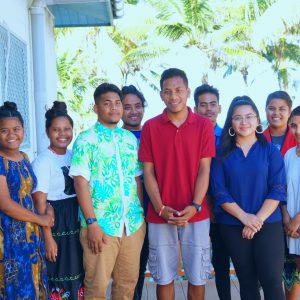Outcomes assessment at the College of Marshall Islands is a systematic and collaborative process. Academic and administrative departments define their own outcomes of specific topics or skills students, employees, and other stakeholders receive from learning, service, activities, and experiences provided. Assessment of defined outcomes is data-based and data-focused. The definition and assessment of outcomes involve the department’s direct supervisors while the Institutional Effectiveness Committee oversees the process in the College.
There are three levels of outcomes at CMI. Institutional-level Outcomes describe goals and objectives that impact the CMI community or all of the students. Program-level Outcomes focus on a specific group of clients such as students in a degree program or employees receiving technological service from the IT department. Course-level Outcomes pertain to an even smaller group of clients served – in this case, students in a particular course or a workshop.

While course- or workshop-level outcomes are assessed annually through the MAPS process, higher-level outcomes are reported every three years through the program review process called FACETS.
- Institutional Outcomes
- Strategic Outcomes (SO) are from the Strategic Plan. These outcomes are developed by IEC and approved by the BOR. It reflects strategic goals and objectives for programs, services, and departments to affect change in the College for the next five years.
- Institutional Student Learning Outcomes (ISLO) are student-centered and describe knowledge, skills, and experiences a student is expected to attain after graduation from CMI regardless of degree program type. ISLOs are developed by IEC and approved by the BOR. Assessment of ISLOs is not for the purpose of evaluating any single program, department, course, instructor, or student. The purpose is to understand the progress of the institution with regards to its overarching goals for student learning and to contribute, through this understanding, to continuous quality improvement.
- Program Level Outcomes
- Program Learning Outcomes (PLOs) are student-centered outcomes that describe knowledge, skills, and experiences students are expected to attain at the completion of credit-bearing post-secondary curriculum, adult basic education or adult high school, non-credit bearing CTE, and continuing education curriculum. PLOs are developed by the department that owns the curriculum and are approved by CC. Further guidance is provided in the CC Manual.
- Service Area Outcomes (SAOs) are client-focused and describe knowledge, skills, and experiences clients are expected to attain after services are rendered by a service area, program, or department. Clients can be a mix of students, faculty, staff, groups, or community members. SAOs are developed by the program or department heads and approved by IEC. Guiding principles in establishing SAOs are provided in the Outcomes Assessment Handbook while its assessment is part of FACETS.
- Student Development Outcomes (SDOs) are student-focused and describe knowledge, skills, and experiences students are expected to attain after receiving a service or academic support service or participating in a student or academic support program. SDOs are developed by the program or department heads in a student or academic support program and are approved by IEC. Guiding principles in establishing SDOs are provided in the Outcomes Assessment Handbook while its assessment is part of FACETS.
- Course- or Workshop-Level Outcomes
- Student Learning Outcomes (SLOs) are student-focused and describe knowledge, skills, and experiences students are expected to attain after completing a course in a credit-bearing post-secondary curriculum, adult basic education or adult high school, non-credit bearing CTE, continuing education curriculum, and a workshop or training. Course SLOs are developed or revised by a faculty expert(s) while the concerned department reviews the proposed SLOs. With an endorsement from the Department Chair, CC approves the SLO. Further guidance is provided in the CC Manual. In the event of conflict of information, the CC Manual overrides this document. SLOs for co-curricula workshops or training are developed by relevant department heads and approved by the LSC.
- The Academic and Student Affairs Integrated Assessment Plan describes the overall picture of learning at CMI from the ISLOs, PLOs, and SLOs.



